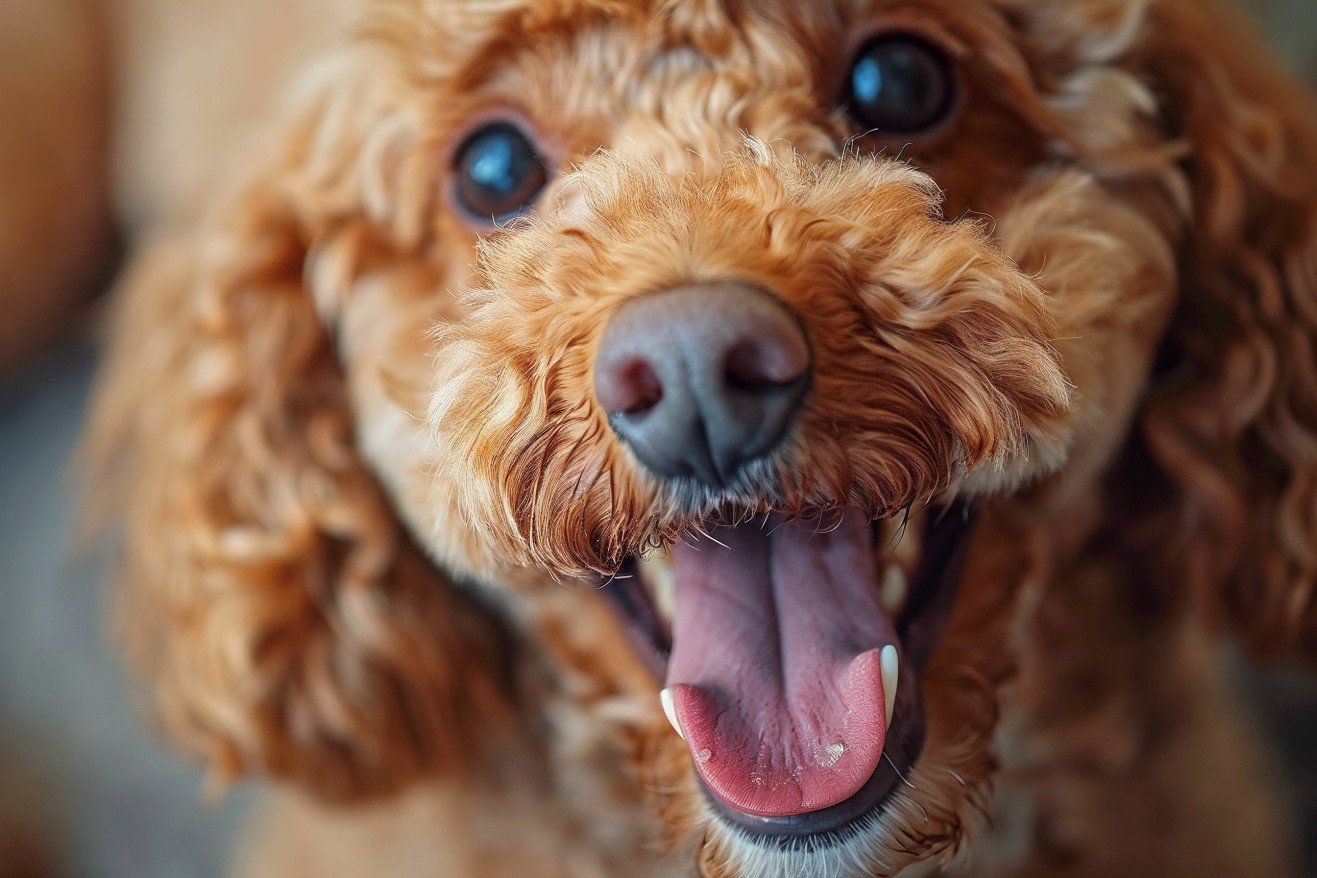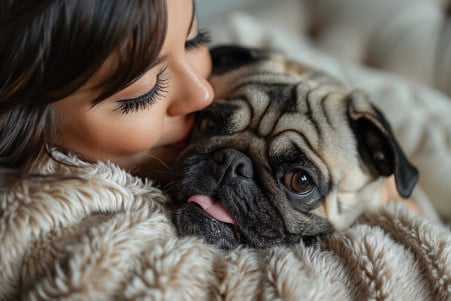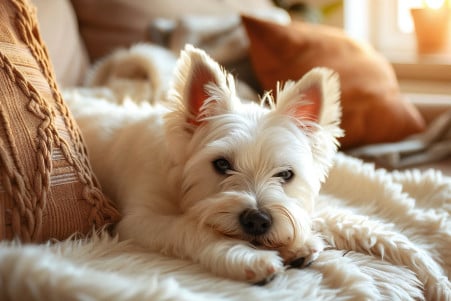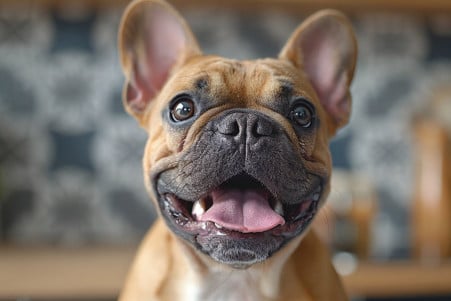Why Do Dogs Lick Their Noses? The Science Behind This Common Behavior
9 May 2024 • Updated 8 May 2024

If you’ve ever wondered why your dog can’t seem to stop licking their nose, you’re not alone. While it may seem like a harmless habit, it could also be a sign of an underlying health issue. While dogs lick their noses to keep them moist and cool their bodies through evaporative cooling, which is normal, if your dog is licking their nose excessively, it could be a sign of an irritation, allergy, or a condition like dry eye or fever. If you notice other symptoms like paw-licking or nasal discharge, it’s best to see a vet.
In this article, we’ll take a deep dive into the science behind this common canine behavior, looking at the many reasons why dogs lick their noses and drawing on research from veterinary medicine, animal behavior experts, and the latest scientific studies. By the end, you’ll have a better idea of when to let your dog’s nose-licking go and when to seek help from a professional.
Why do dogs lick their noses?
The Cooling Effect: How Nose Licking Helps Dogs Regulate Their Body Temperature
While humans sweat to cool down, dogs don't have sweat glands and have to find other ways to keep their body temperature in check. One of these ways is nose licking, which helps dogs cool off through evaporative cooling.
As The Village Vets notes, "Your dog's nose is a major part of what cools down her body. Licking the nose gives your dogs a little bit of cooling that can help her feel better on a hot day." The saliva that dogs lick onto their noses evaporates from the nose and mouth area, taking heat with it.
You may see your dog licking their nose more often in the summer or after they've been exercising, such as after a game of fetch or a walk. PawSafe says, "When a dog wets their dog with cool saliva, the heat evaporates through the saliva by convection, effectively bringing down their temperature." This is an important part of a dog's ability to regulate their body temperature.
This is why it's important for dog owners to make sure their pets have plenty of water and shade, especially when it's hot out. Making sure they have enough to drink and a place to get out of the sun can help them avoid getting too hot. Understanding that dogs lick their noses to cool themselves down also shows how important it is to their well-being and comfort.
Improving the Sense of Smell: How Nose Licking Aids in Scent Detection and Discrimination
The sense of smell is extremely important to dogs, both in terms of their ability to survive and their ability to communicate. As Dogster says, "The nose is one of your dog's vital organs. Licking their noises is one of the dogs' natural behaviors. For instance, dogs usually lick their noses to hone their smell senses."
Licking the nose helps move scent molecules to the vomeronasal organ, which improves the dog's ability to detect odors. According to PawSafe, "Dogs have an incredibly impressive sense of smell, with over 100 million olfactory receptors (300 million in bloodhounds). Licking moisture to the nose intensifies a dog's already sensitive sense of smell, as a dry nose doesn't capture scent particles like a wet one." This helps dogs take in more information about their environment and the animals and people in it.
Dogs may lick their noses more often when they're exposed to new or interesting scents. The Village Vets explains that a dog will lick her nose "to clear her nose when she smells something she likes to make it easier for her to get a good whiff of the smell." This is especially true for dogs with a strong sense of smell, like bloodhounds.
Anxiety and Stress: When Nose Licking Becomes a Compulsive Behavior
Sometimes, compulsive or excessive nose licking can be a result of anxiety or stress in dogs. Dogster explains, "When your dog is confused, anxious, or doesn't understand what is going on, it may lick its nose." This can be accompanied by other signs of anxiety, like panting, pacing, or whining.
Dogs may lick their noses due to anxiety if they are exposed to certain stimuli, such as loud noises, or if they are separated from their owners. PawSafe says that "Licking their nose is one coping mechanism for nervousness and anxiety in dogs. Some dogs have separation anxiety, while others have generalized anxiety triggered by things like thunder, fireworks, or car rides."
If anxiety is the cause of compulsive nose licking, then addressing the anxiety through training, environmental changes, or medication can help reduce the licking. As BetterPet says, "Treatment options for excessive nose licking include allergy medication, nose balms, addressing stress, and veterinary care for underlying health issues." Owners should seek the help of a veterinarian or animal behaviorist if the behavior is severe or interfering with the dog's quality of life.
Medical Concerns: Signs of Potential Health Issues
While some dogs may lick their noses from time to time, excessive or constant licking may be a sign of an underlying medical issue. The Village Vets lists potential causes as respiratory infections, allergies, dehydration, or nausea. In these cases, owners should look for other symptoms like nasal discharge, sneezing, or a lack of appetite.
Dogster explains that there are also some medical issues, like nasal tumors or dental problems, that can lead to excessive nose licking. PawSafe adds that dehydration is a common cause, as dogs will lick their noses to try to moisten them.
If the behavior continues or is accompanied by other symptoms, it's best to see a vet. This way, you can find the cause of the issue and treat it, which will help stop the excessive nose licking and ensure that your dog is healthy.
How to Stop and Treat Excessive Nose Licking in Dogs
Stopping and treating excessive nose licking in dogs will likely require a combination of environmental, behavioral, and medical interventions. According to The Village Vets, environmental and behavioral interventions can include making sure that your dog is mentally stimulated and not bored, and that they have plenty of water and shade to prevent dehydration and overheating, which can lead to more licking.
If your dog is licking their nose compulsively, Dogster recommends using a cone collar or a bitter-tasting spray to stop the behavior. It's also important to make sure that you're treating any underlying medical conditions or allergies that may be causing the licking. According to PawSafe, "Treatment options for excessive nose licking include allergy medication, nose balms, addressing stress, and veterinary care for underlying health issues."
If you're unable to stop the excessive nose licking or if it's accompanied by other symptoms, it's important to seek help from a veterinarian or animal behaviorist. They can help you figure out what's causing the behavior and develop a treatment plan to help you manage it. By taking a proactive approach to the problem, you can make sure that your dog is as healthy and happy as possible.
Conclusion: What Does It Mean When a Dog Licks Its Nose?
Dogs lick their noses to help keep them moist and to cool themselves down through evaporative cooling. As The Village Vets notes, "Your dog's nose is a major part of what cools down her body. Licking the nose gives your dogs a little bit of cooling that can help her feel better on a hot day." This is an important part of a dog's thermoregulation.
Nose licking also helps dogs improve their sense of smell. Dogster explains, "The nose is one of your dog's vital organs. Licking their noises is one of the dogs' natural behaviors. For instance, dogs usually lick their noses to hone their smell senses." This helps dogs get more information about their environment and potential threats or prey.
On the other hand, nose licking can also be a sign of anxiety or stress in dogs. According to Dogster, "When your dog is confused, anxious, or doesn't understand what is going on, it may lick its nose." Training, environmental changes, and medication can all help reduce anxiety and, in turn, reduce compulsive behaviors like excessive nose licking.
Although some nose licking is normal, excessive or constant nose licking can be a sign of an underlying health issue. The Village Vets explains that potential medical issues that can cause nose licking include respiratory infections, allergies, dehydration, and nausea. If your dog's nose licking is constant or accompanied by other symptoms, it's important to see a vet.
By identifying and addressing the root cause of the behavior, it may be possible to reduce excessive nose licking. And by understanding why dogs lick their noses, dog owners can be better prepared to meet their pets' needs.


